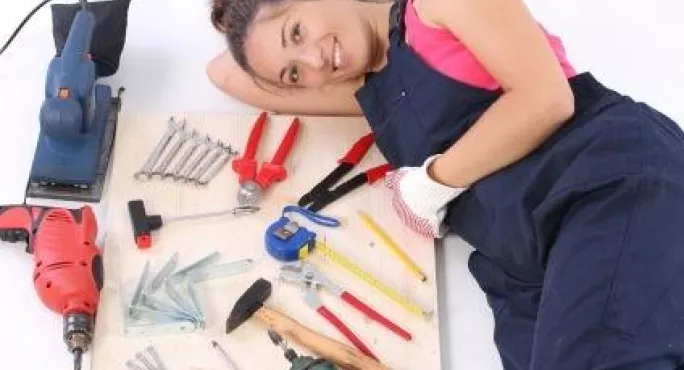Can a spanner change a girl’s attitude to work?

The boys stare at the bottle of nail varnish with narrowed eyes. Then one picks it up and paints a tiny, glittery streak on the paper in front of him. “I feel gay,” he says. “I feel gay doing this.”
He and his Year 9 classmates are taking part in a one-off afternoon workshop in hair and beauty at their Norwich school. The aim is to give the boys - many of themwould automatically dismiss such activities - the chance to experience what a GCSE-level hair and beauty course involves.
Many, however, are unimpressed. “It’s not what I want to do,” says 14- year-old Luke Cresswell. “I want to be a mechanic.”
Next to him, Tim Cary, 13, is bemused by a bottle of gold varnish. “It’s a woman’s thing,” he says. “It’s fun playing with colours, but it’s a woman’s thing.”
In another corner, boys are wielding cans of hairspray like weapons. In the chemical haze, they attempt to style mannequin heads. One boy has pulled the plastic model’s hair into a vertical spike on the crown of its head, sprayed into solidity.
Devon Briggs, 13, is plaiting hair with a look of quiet concentration. “I thought, `Oh, my God, why am I doing this?’” he says. “You just think, `Hair and beauty - that’s a girls’ thing.’ But then I get here, and I’m enjoying it.”
The afternoon event, at Framingham Earl High, has been organised by OpenOpportunity, an outreach group based at Norwich City College. The project is one of six similar schemes around the country, each receiving Pounds 5,000 of government funding. The idea is to break down gender stereotypes. Boys are co-opted into sessions on hair and beauty, creative media or health and social care.
“Stereotypes run through every aspect of their life,” says Helen Norton, the diploma manager for OpenOpportunity.
“Their parents, siblings, even their teachers find out they’re doing health and beauty and take the pee out of them. So this is just an attempt to raise awareness and give them another option.”
Girls are learning about motor vehicle engineering, sport and leisure or information technology.
In a nearby room, a group of girls stare in silent indifference at a collection of motor parts. “Has anybody thought about the motor trade before?” the instructor asks. “Anyone know what it entails?”
A couple of girls shuffle uncomfortably. One fiddles with her hair. Another inspects her nails. Finally, one girl puts up her hand. “My stepdad does stuff if a lorry crashes. He spray-paints it and stuff.”
Then the instructor puts on a video in which a young woman talks about her job as a KwikFit technician. “There’s more to it than people think,” she says. “It’s a bit weird being a girl in this environment, but you get used to it.”
In the ICT suite, Year 9 girls sit around discussing EastEnders and making half-hearted attempts at graphic design.
“I don’t like it very much,” says Issy Bradbury, 13. “I don’t like computers. I can do my homework on Microsoft Word, but otherwise I don’t go near them. They’re so uncreative and boring.”
Theirs is not a gender-based objection, they explain - it is just an objection.
“It’s not that it’s a boys’ thing,” says 14-year-old Ellie Keeler. “But computers are things for people who are good at computers. And I’m not. It gives me a headache. I like being outdoors. I’d like to do a job with horses.”
But Arthur Vandenbergh, assistant head at Framingham Earl, says no one is really expecting a Damascene conversion. He is running the sports and leisure session, outlining the girl-friendly careers such a qualification could lead to.
“This is really just to say, `This is available, have a think about it, ask some questions,” he says.
“It’s broadening horizons. We’re making connections between where they’re going and where they might want to go. It’s what they’re interested in that matters.”
Ms Norton says the workshops are intended merely to give pupils choices - a more interactive version of what might otherwise be taught in personal, social and health education. She says many of the boys are significantly more creative than the girls in traditionally female subjects. Given a hairdressing mannequin, for example, girls merely attempt to recreate celebrity hairstyles. Boys, by contrast, look on it as an exercise in hairspray-based construction.
“We don’t want to push them into careers they don’t want to do,” she says. “You’re never going to solve the problem in one day. Ideally, we should be starting in primary school. It’s all just part of an ongoing process.
“But if they’re secretly interested, this might just be the push they need to get them to apply for a course.”
Keep reading for just £1 per month
You've reached your limit of free articles this month. Subscribe for £1 per month for three months and get:
- Unlimited access to all Tes magazine content
- Exclusive subscriber-only stories
- Award-winning email newsletters



